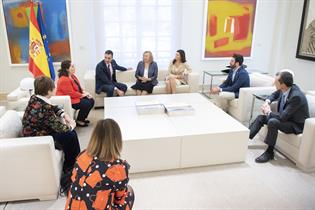At the "Science and the 2030 Agenda" meeting
President of the Government believes that science is "crucial" for Spain's commitments to UN 2030 Agenda
President's News - 2019.3.18
Images of the “Science and the 2030 Agenda” meetingPool Moncloa / Diego del Monte / Jorge Villar2019.3.18
Moncloa Palace, Madrid
In his speech, Pedro Sánchez said that the two fundamental pillars upheld by social commitment and scientific progress are essential to such challenges as climate change, growing inequality and child poverty. He believes that science "is crucial" for Spain's commitments to the United Nations 2030 Agenda. "There is nothing", he said, "that we can do to achieve the Sustainable Development Goals without an unequivocal and firm commitment to science and innovation". Scientists "should be scientists, researchers, professionals serving science, not heroes whom we thank posthumously" following long careers full of sacrifice, added Pedro Sánchez.
The President of the Government believes there is an "essential" need for a major State pact capable of offering stability to science policies, programmes and investments, adding that one of the "most gratifying" moments in his term in office so far was the consensus reached in the Lower House of Parliament for a unanimous vote on approving the urgent measures in science and technology that will allow workforces at public research bodies to be consolidated, the Statute of Scientific Staff in Training to be launched and the administrative process for research projects to be simplified. Pedro Sánchez believes this agreement clearly reflects the hope Spain has placed in its researchers and the unanimous respect and consideration their efforts for Spanish society as a whole deserve.
The President of the Government advocated this agreement because, as is the case in science, major achievements require planning and time for testing and mistakes. "It may be that the pace of science is not the same as the speed with politics is done", he said, "but that is precisely why policy can never turn its back on science again".
Urgent promotion of science
Pedro Sánchez said that Spain is a country "that arrived too late for its meeting with science" and "where there was a lack of interest in recognising its talent" but that "has now learned its lesson". He said that Spanish scientists "have depended on inspiration from a mentor, professor or simply a good man", and that many have been forced to travel overseas to follow a career. "Today, we should be more mindful than ever of the situation in science and the urgent manner in which we should be promoting it", he said.
 Pool Moncloa / Borja Puig de la BellacasaThe "Science and 2030 Agenda" meeting was attended by directors of public research bodies and centres, university professors and department leaders, as well as some of the best pre-doctorate and post-doctorate scientists hired under the research staff training programmes and the Ramón y Cajal or Juan de la Cierva programmes, all of which are run by the State Research Agency of the Ministry of Science, Innovation and Universities.
Pool Moncloa / Borja Puig de la BellacasaThe "Science and 2030 Agenda" meeting was attended by directors of public research bodies and centres, university professors and department leaders, as well as some of the best pre-doctorate and post-doctorate scientists hired under the research staff training programmes and the Ramón y Cajal or Juan de la Cierva programmes, all of which are run by the State Research Agency of the Ministry of Science, Innovation and Universities.
Four researchers were interviewed at the meeting: firstly, Rosa Menéndez, President of the Spanish National Centre for Scientific Research [Spanish acronym: CSIC], a chemist, expert in carbon materials and researcher in the use of graphene in biomedicine and energy storage; and secondly, Raquel Yotti, Director of the Carlos III Health Institute, a specialist in cardiology and clinical researcher for the National Health System, who spoke about healthcare research.
Two researchers from the CSIC also took part. Teresa Valdés-Solís, a chemical engineer and doctor in environment technologies, who is also the face of the '11 de Febrero' Project aimed at raising the profile of work by female scientists, creating female roles in the fields of science and engineering, and promoting practices that foster gender equality in science. Her talk focused on equality and encouraging young women in "STEM disciplines"; in other words, those related to Science, Technology, Engineering and Mathematics.
In turn, Pablo Rodríguez Ros, a Bachelor of Environmental Science who earned extraordinary honours for his degree, Master in Global Change and pre-doctorate at the Barcelona Institute of Ocean Science, spoke about climate change.
Non official translation





